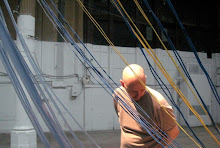I will reveal with trepidation that I have watched on and off during the show's run. What appeals to me about it is not the music but the human drama. They put these people, who are basically green - sometimes totally so - through a horrendous hazing. I'm sure these newbees are working exhausting non-stop 12 hour days, trying to wring out as good as possible a presentation in the short time they have. Then they are put through a harrowing gauntlet as they are critiqued on live television after basically baring all - singing in a situation with virtually no safety net. It's brutal.
How do they even handle it? When I'm slightly behind on a work deadline my heart starts pounding like I'm going to go into cardiac arrest!
One can certainly argue vociferously against certain aspects of the show, and I would join you happily in that viewpoint. For example, imagine a young Bob Dylan, or Jimi Hendrix, or Patti Smith, or David Byrne, or John Lennon trying out for Simon Cowell? The artistry that those people created would be totally lost on him. So the show's viewpoint is very narrow -- painfully, painfully narrow.
And that brings me to the point of this...
Watch out for what your mentors say. It's not the truth:

You read that right - it's not the truth. Think about that for a minute...
The other night as I was doing some sidework in the studio, I had a show on the TV in the background called "American Idol Rewind". That's where they rehash the trajectory of the show's events from a previous season. I usually hate the rehashes, but I was struck by this particular show. It was devoted to a contestant named Chris Daughtry, who was eliminated in a previous season in the 4th spot, but who has gone on to a very successful career (more successful than some winners). In my opinion, he's one of the more authentic performers to have come from the show.
To start off with, Simon voted thumbs down at his audition, saying he could hear his singing in any two-bit bar in the country (paraphrasing). In my opinion that's hubris, pure and simple. It wasn't because it was in any way cringworthy, he just didn't like it because of the bee in his bonnet, which was masquerading as the "truth".
All along the way - condensed in the rewind show - Simon had similar kinds of comments about Daughtry.
It started dawning on me that the narrative that exists out there about Cowell "telling the truth" is incorrect. Simon Cowell is decidedly UN-shy in giving his opinion, but his opinion should NOT be construed as the truth.
In fact, looking back on this particular case, I perceived Cowell spoiled snob who's unable to recognize another reality might simultaneously exist. Yes, Simon's been able to have success guiding people's careers, and that's an admirable accomplishment, but it's an act of creation, not reduction. Put another way, there's not right, and there's not wrong. It's all possibility. Maybe his 'make or break' credentials in the industry lead him to believe he's looking through some special "truth lens", but what he's really doing is deciding on a personal preference and then mobilizing to make that possibility (one of many) a reality.
My guess is one of two things - 1) that he's not emotionally awake enough to have that distinction...either that - or 2) he's an actor playing a very piss-y part.
Enough said, I don't mean to pick on him for not being a spiritual guru. I'm no Bodhisattva myself.
But what I mean to say is this: Be very, very careful when you listen to those voices that tell you you're not doing it right, or that you're not good enough - even from high places. Learn to recognize when the harsh voices in your head are yours (hint: if they're overly harsh that's unlikely) or someone else's. Also watch as to whether they resonate truthfulness, or instead prey on insecurity.
Here is a key distinction taught to me by a kind and mindful spiritual teacher I know: If you find yourself internally judging yourself rudely or harshly, it's not your voice doing the talking.....it's the voice of others - strangers, friends or family - who have judged you unkindly in the past. In fact, if you think hard enough, you can usually identify the speaker (as in, my mother used to say "x", my high school teacher told me "y".).
Although it may be sometimes hard to believe, you love yourself unconditionally.
Here's the kicker: those voices are not going anywhere - and don't expect that they will. Sometimes they will be made manifest in your head, by people on the periphery, or by people actually in your life, and they will undoubtedly litter your path throughout your journey.
But if you play your cards right, and work to keep them in perspective, they will be a small residual refuse of something great that you create....

